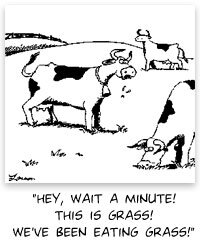Soupie
Paranormal Adept
It's the reverse: Beliefs about what our bodies and minds are made of follow from how we feel about our bodies and minds. (Or at least that's the concept I was conveying.)@smcder
I'm not sure how one "feels" about their mind and body follows from beliefs about what they are made of .... ?
Well, because it's a subjective feeling/experience, it's difficult to describe. I'm extremely introverted (resist reading that as "socially anxious" because I'm not socially anxious). I tend to view most physical needs/processes as a nuisance: eating, sleeping, defecating, talking, etc. I'm sure that sounds bizarre and creepy, haha. When I was in college, my apartment room looked like the inside of a shoe box. This was partly due to having no money, but also because I could generally give a damn about having pretty things around me. My typical outfit is jeans and a black t shirt.
In the one Peterson lecture, he asked the students to consider why they have Christmas trees. He said "You don't know why you do!" I had to chuckle: If I had my druthers, I wouldn't do anything for any "holiday." I don't want a Christmas tree.
I live in the world of ideas and concepts, not the world of objects and the sensations we have from interacting with them.
(Now, I'm trying to convey how I feel here. This is not to say that I don't enjoy certain physical experiences, but I clearly do not enjoy/seek them to the extent that most other people do. I am not a sensual person, I'm the polar opposite.)
I am totally caught up on substance and properties! See, for me, that is the fun of it all. Trying to make sense of it and figure it out.@smcder
however, I don't think anyone has much of a clue about consciousness (in terms of a scientific explanation - see Peterson's video above) ... so I'm not caught up on substances and properties at this point.
I am interested very interested though in what people think are the consequences of their beliefs . . .
I have no formal training in philosophy of mind, metaphysics, or neurology. I haven't read any books on consciousness either. It has been a blast for me the past several weeks to read formal theories and terms which mirror my own ideas and intuitions about reality and consciousness.
I agree that humans don't have much of a clue - they have a clue, but not much of one - but for me, the joy is in discussing and developing my own views and the views of others, while fully realizing that I may be wrong. (I haven't gotten the point where Peterson talks about consciousness... but I have gotten through most of that lecture. It must be at the very end.)
I'm pretty much uninterested in what people think are the consequences of their beliefs, haha.
I would say little to no practical difference must necessarily follow from being either a property or substance dualist. It would likely impact (not negate) religious beliefs though, such as beliefs about souls and heaven. For example, I'd imagine that a substance dualist would believe that the soul and heaven were made of a different substance than their body and the universe. A property dualist - while they could still believe in souls and heaven - would not believe these things were made of a different substance then their body and the universe, they would simply believe these entities/structures were made of a different form of the substance.@smcder
... so, for you, what do you think the differences in the world are for a substance vs a property dualist? Does one view rule out certain religious beliefs for example that the other does not? Or are there moral consequences for one view vs another? Do you think certain things about free will and responsibility necessarily follow from one of these views vs another? In other words, what practical differences (if any) follow from holding these different beliefs about the mind?

